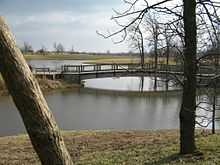Powell Gardens

Powell Gardens is a 915-acre (3.70 km2) botanical garden in Kingsville, Missouri, USA, 30 miles (48 km) east of Kansas City. It features 6,000 varieties of plants, with 225,000 plants in seasonal displays, and is open to the public, for a fee, during daylight hours.
The garden dates to 1948, when the land was purchased by George E. Powell, Sr. Since then, the site has been a dairy farm, a Boy Scout camp, an agricultural and natural resource center, and since 1988, a botanical garden.[1]
History
.jpg)
Powell Gardens' history begins in 1948, when George E. Powell, Sr., a prominent Kansas City businessman, acquired the beautiful tract of land that is now Powell Gardens. Mr. Powell had learned firsthand about the sometimes harsh and unpredictable life of farming during his childhood on the family farm. In 1917, he left to pursue a business career in Kansas City. He, along with his son George Powell Jr., and others, took over ownership of Yellow Transit Freight Lines, now YRC Freight, in 1952. Throughout his successful business career, Mr. Powell never lost interest in the lands of Missouri. He and his family and friends enjoyed many weekends on his Johnson County, Missouri, farm.
In 1969, in keeping with his stewardship philosophy, Mr. Powell donated the 640-acre (2.6 km2) farm to the Kansas City Area Council of the Boy Scouts of America, who used it as a regional camp until 1984. In 1984, with the University of Missouri’s School of Agriculture as a catalyst and partner, the Powell Family Foundation began developing a horticultural and natural resource facility called Powell Center.
As a part of this development, Powell Center retained Pittsburgh, Pennsylvania-based Environmental Planning and Design, the leading U.S. consultants for botanical gardens. The firm recognized that the site would be ideal for development as a botanical garden. In 1988, official ties with the University of Missouri ended and Powell Gardens Inc., a not-for-profit organization, was established. A 19-member board of directors, in which several Powell family members serve, governs Powell Gardens. Friends of Powell Gardens, a separate organization, is made up of more than 5,000 members. Staffing at the gardens fluctuates between 35 employees during off-season and close to 70 in peak season. Powell Gardens is supported through private donations and admission, gift shop and rental revenues.
Gardens

- Entrance drive – seasonal annuals, evergreen weeping white pines, native oak groves, natural meadows and woodlands with native prairie wildflowers and wild grasses.
- Garden Gatehouse – drought tolerant ornamental plants (mainly native). Dogwood, redbuds, and red sumac, ornamental grasses, and annuals.
- Parking lot – arboretum of all shrubs and trees native to Kansas and Missouri, with native grasses, shrubs and trees.
- Conservatory – a 50 by 50 foot (15 by 15 m) glass house with seasonal orchids, tropical plants, chrysanthemums, and poinsettias.
- Terrace beds and wall – annuals and tropicals.
- Dogwood walk – almost every variety of dogwood, including flowering dogwood, hybrid dogwoods, and Kousa dogwoods, with roses and magnolias.
- Island garden – more than 200 varieties of water plants.
- Meadow – native prairie grasses and flowers, burned each spring.
- Chapel walk and landscape – native oak-hickory woodland with native woodland wildflowers, including a collection of many varieties of redbud tree.
- Rock and waterfall garden – azaleas and rhododendrons, ferns, bleeding hearts, hostas, astilbes, giant butterburs and spring bulbs.
- Perennial garden – more than 1,200 varieties, including daylilies, daffodils, hibiscus, and hardy asters and chrysanthemums, with ornamental grasses, against an evergreen background.
- Byron Shutz nature trail – 3 miles (4.8 km) of trail with native and naturalized trees, shrubs, grasses and wildflowers, including biscuitroot, draba, and prairie-plum.
- Heartland harvest garden – 12-acre (49,000 m2) garden featuring popular fruits and vegetables, showcasing "the journey of food from seed to plate". This garden features a French country style kitchen garden, greenhouses, a vineyard of native and European grapes, quilt gardens of local farm produce, and a youth education garden called the fun foods farm.
Attractions
The Marjorie Powell Allen Chapel is a 4,700 sq. ft. nondenominational wedding chapel that first opened in 1996. It was designed by architect E. Fay Jones and is made of mostly wood and glass.[1]
In 2001, Powell Gardens set up an attraction that featured giant bugs 100 times their normal size scattered across the landscape. It included three ants that weighed 700 pounds each and were 25 feet long. There was also a 1,200 pound female praying mantis, a 50-pound spider, and a 100-pound damselfly. They have done the exhibit in 2004 and in 2010.[2]
See also
- List of botanical gardens in the United States
References
- ↑ 1.0 1.1 Austin Alonzo (July 11, 2014). "My Favorite Building: Marjorie Powell Allen Chapel at Powell Gardens". Biz Journals. Retrieved February 2, 2015.
- ↑ Lisa Gutierrez (July 18, 2010). "Monster-sized insects infest Kingsville’s Powell Gardens". Columbia Tribune. Retrieved February 2, 2015.